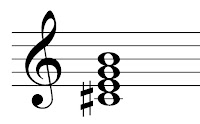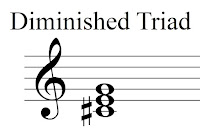Diminished triads are chords built from
stacked minor-thirds. A diminished triad has three notes: the root of
the chord, a note a minor-third above the root, and a note a
diminished-fifth above the root. The diminished chord gets its name
from this diminished-fifth interval.
If we stack another minor-third on top
of a diminished triad, we get a diminished-seventh chord. This
creates and interval of a diminished-seventh above the root of the
chord. This interval is what gives the diminished-seventh chord its
name.
 |
| Diminished-seventh Chord |
If we instead add a major-third on top
of a diminished triad we get a half-diminished-seventh chord.
 |
| Half-diminished-seventh Chord |
Diminished chords are
usually indicated with the following symbols: “°”
or “dim” for diminished triads, “°7”
or “dim7” for diminished-seventh chords, “ø7”
or “m7♭5”
 |
| Chord symbols for diminished chords |
Diminished chords have an unstable
sound and usually resolve to a major or minor chord one half-step
higher.
 |
| Normal resolution of diminished chords |
Diminished chords can also
resolve in less common ways, such as the following:
 |
| Other resolutions of diminished chords |

